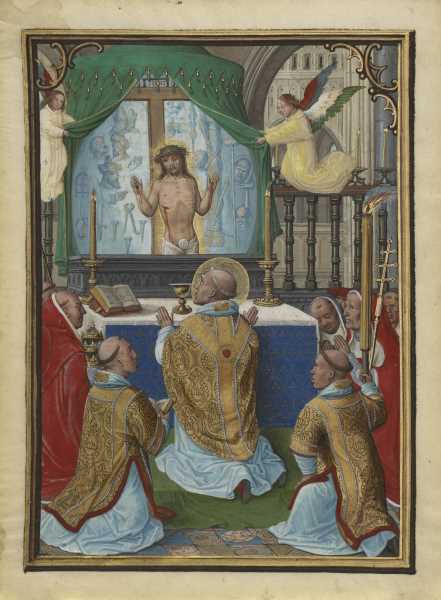 The letters in the New Testament provide a great explanation of the theology of the Eucharist. They cover essential truths and show what the Church has believed from the start.
The letters in the New Testament provide a great explanation of the theology of the Eucharist. They cover essential truths and show what the Church has believed from the start.
Our ability to articulate our beliefs on the Eucharist developed over the centuries. It is a mystery we cannot fully understand and explaining this mystery took time to develop the necessary vocabulary. For example, the word transubstantiation was not used until the 11th century, but we can see the belief in transubstantiation in the earliest writings of the New Testament. The early church just did not have the word for it. Paul is clear that the bread and wine become the body and blood of Christ. He warns that receiving the Eucharist without accepting this belief brings judgment on us.
John makes it clear in his letter that the Eucharist is effective – it does something. The thing that it does is cleanse us of sin. It is through the blood of Jesus that we are healed. John explains that the Eucharist is not a repetition of the crucifixion. Jesus died once, but we enter into this once and for all sacrifice at every Mass through the body and blood of our Savior.
In Hebrews, we see even more. The Eucharist is related to the sprinkling of blood in Exodus. When the Israelites entered into a covenant with the Lord, they had to physically participate in the consummation of the covenant. We also have to physically participate in the new and everlasting covenant. We do this through the Eucharist.
Scripture passages from the New Testament Letters on the Eucharist:
- 1 Cor 9:13-14 – Live by the Gospel
- 1 Cor 10:16-17 – Cup of Blessing
- 1 Cor 11:27-29 – Receiving unworthily
- Rom 12:1,4-6 – Offer your bodies as a living sacrifice
- 1 John 1:5-7 – The Blood Cleanses
- Hebrews 9:13-14 – Unblemished Sacrifice
- Hebrews 9:19-26 – Moses Sprinkled Blood
- Hebrews 10:19-22 – The Veil of His flesh
1 Cor 9:13-14 – Live by the Gospel
Do you not know that those who perform the temple services eat (what) belongs to the temple, and those who minister at the altar share in the sacrificial offerings? In the same way, the Lord ordered that those who preach the gospel should live by the gospel.
In the Temple, those who performed the temple services ate the meat of the sacrifices. That is how they directly and physically participated in the offerings. Paul is describing this to make it clear that we must participate in the sacrifice of Jesus by eating the meat of the sacrifice. We must do as Jesus commanded and eat His flesh and drink His blood.
Paul goes on to say we should live by the Gospel. The Gospel is the good news of Jesus. It is easy to read this symbolically, that we are commanded to obey the Gospel. This is true. We are expected to obey the commands of Jesus. There is also a more literal meaning. The core of the Gospel is that Jesus offered Himself so that we could live. He said that if we eat His flesh and drink His blood, we will have eternal life, and if we do not eat and drink the Eucharist, we will have no life within us (Jn 6:53-4).
The implication of this is that we must eat the Word of God made flesh to have life. We must live by the Gospel, eating the Word in the Eucharist.
1 Cor 10:16-17 – Cup of Blessing
The cup of blessing that we bless, is it not a participation in the blood of Christ? The bread that we break, is it not a participation in the body of Christ? Because the loaf of bread is one, we, though many, are one body, for we all partake of the one loaf.
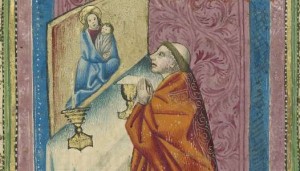 Paul makes it clear that the reception of the Eucharist is a participation in the body and blood of Jesus. This is not a symbolic participation. We truly unite with Jesus.
Paul makes it clear that the reception of the Eucharist is a participation in the body and blood of Jesus. This is not a symbolic participation. We truly unite with Jesus.
Jesus is the one loaf, and when we receive Him, we become one. The implications of this are incredible. We are truly joined to Our Lord and become one with Him. This is certainly not something we deserve or could ever earn. It is a free gift from God out of love. The reception of the Eucharist is an intimate union. The closest comparison to this that we have is marriage. In marriage, a man and woman become one flesh. This is tremendously intimate and beautiful, but the Eucharist is so much more. When we unite with Jesus in the Eucharist, we unite our body, blood and soul with His body, blood, soul and divinity. Jesus shares everything that He is with us.
This union is not isolated to just our individual relationship with Jesus. When we unite with Jesus and become one with Him, we also become one with every person united with Jesus. The Eucharist unites us to each other.
1 Cor 11:27-29 – Receiving Unworthily
Whoever eats the bread or drinks the cup of the Lord unworthily will have to answer for the body and blood of the Lord. A person should examine himself, and so eat the bread and drink the cup. For anyone who eats and drinks without discerning the body, eats and drinks judgment on himself.
Paul again reinforces that the Eucharist is the body and blood of Jesus. There is no doubt in Paul’s writing. Jesus is truly present in the Blessed Sacrament.
Paul gives three warnings for those who receive the Eucharist. The first warns against receiving unworthily. This could have two meanings. It could be a warning against receiving without adequate reverence and humility. If we are irreverent toward the Eucharist, this would be a direct offense against Jesus. The other meaning could be a warning to avoid receiving in a state of sin. If we have sinned gravely and we receive the Eucharist, our reception would offend and mock Jesus.
The second warning is to examine ourselves. This is likely referring to examining ourselves for grave sin so that we will not receive the Eucharist in a state of sin.
The third warning is against receiving when we do not believe in the true presence of Jesus in the Eucharist. Paul is saying that we bring judgment upon ourselves when we receive the Eucharist without faith in the Eucharist.
These are significant warnings, and make it clear that we must have faith in the true presence of Jesus in the Eucharist. We may see, smell and taste bread and wine, but we should never doubt that Jesus is fully present, body, blood, soul and divinity, in the Eucharist. With this faith in the true presence, we need to treat the Eucharist with the reverence that the King of Kings deserves.
Romans 12:1-5 – Offer your bodies as a living sacrifice
I urge you therefore, brothers, by the mercies of God, to offer your bodies as a living sacrifice, holy and pleasing to God, your spiritual worship. Do not conform yourselves to this age but be transformed by the renewal of your mind, that you may discern what is the will of God, what is good and pleasing and perfect. For by the grace given to me I tell everyone among you not to think of himself more highly than one ought to think, but to think soberly, each according to the measure of faith that God has apportioned. For as in one body we have many parts, and all the parts do not have the same function, so we, though many, are one body in Christ and individually parts of one another.
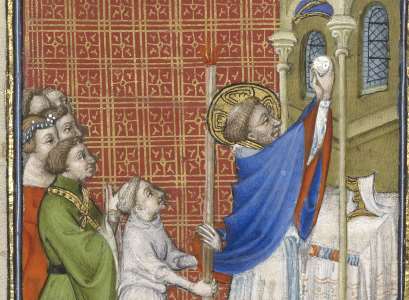 Paul wants us to offer our bodies as a living sacrifice. This could easily be interpreted as a call for mortification and martyrdom. This would be good advice since we should sacrifice and suffer for our Lord. Mortifications help us renounce the world and focus on God. Despite the truth of this interpretation, Paul is pointing to something much deeper.
Paul wants us to offer our bodies as a living sacrifice. This could easily be interpreted as a call for mortification and martyrdom. This would be good advice since we should sacrifice and suffer for our Lord. Mortifications help us renounce the world and focus on God. Despite the truth of this interpretation, Paul is pointing to something much deeper.
Paul wants us to understand that we are one body in Christ. This is Eucharistic language and reminds us that we unite with Jesus in the Eucharist. We are truly one body with Him when our body and blood unite with His body and blood.
To unite with Christ, we take His body and blood into us. We become a part of Jesus and become like Jesus. This transformation is not without cost. We must give up ourselves. We give up our flesh and receive Jesus’ flesh as a replacement. We give up our blood and receive Jesus’ blood in return. When we eat regular food, that food becomes us. But, when we receive Jesus in the Eucharist, we are transformed into the food we eat to be like Him.
This is the message Paul wants to give us. We need to sacrifice our bodies, giving them up, and in exchange, we receive the body and blood of Jesus. At the offertory in Mass, we carry up the bread and wine, but we also offer ourselves. In the Eucharist, we receive the life of Jesus to replace our life.
1 John 1:5-7 – The Blood Cleanses
Now this is the message that we have heard from him and proclaim to you: God is light, and in him there is no darkness at all. If we say, “We have fellowship with him,” while we continue to walk in darkness, we lie and do not act in truth. But if we walk in the light as he is in the light, then we have fellowship with one another, and the blood of his Son Jesus cleanses us from all sin.
John highlights how important it is to have integrity throughout our lives. We cannot be united to God if we do not walk in light all the time. In other words, we cannot be Catholic only in church. We cannot practice our faith only when it is convenient or easy. We cannot live one life in the world and another life following God. We must have total unity and integrity across all our actions.
John then, in what almost appears as an afterthought, ends with a statement that the blood of Jesus cleanses. This brings to mind the image of the great multitude in Revelation, where the multitude wore white garments that had been washed in the blood of the Lamb. We are washed and cleansed in the blood of Christ. It is an important image, but how does it relate to walking in the light?
The cleansing from Jesus’ blood is extremely intimate and permeates us completely. We enter into Jesus’ sacrifice through the Eucharist, and His blood enters into us. We drink it and the fullness of Christ infiltrates every part of us and saturates us completely. We become completely united with Jesus. When a man and woman marry and consummate their marriage, they only hint at the depth of the intimacy that Jesus offers each of us.
The union cannot be a part-time or lackadaisical relationship. If we are going to have the blood of the Son of God in every cell of our body, we cannot continue to live according to sin.
John uses the image of walking in light. Jesus is light, so when we receive the Eucharist, we are in the center of the light of God. The Eucharist cleanses us, so we stand before God clothed as Christ (He gives us His body and blood). The Father looks at us with all the love He has for His Son because we are clothed with His Son united intimately with His Son. After this union is consummated in the Eucharist, sin is a tremendous offense against God and reeks of deceit and dishonesty. We need to strive to stay in the light.
Hebrews 9:13-14 – Unblemished sacrifice
For if the blood of goats and bulls and the sprinkling of a heifer’s ashes can sanctify those who are defiled so that their flesh is cleansed, how much more will the blood of Christ, who through the eternal spirit offered himself unblemished to God, cleanse our consciences from dead works to worship the living God.
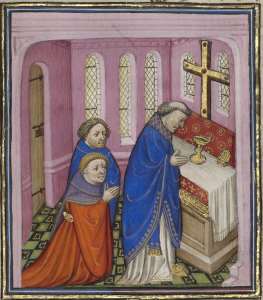
The author compares the sacrifices of the Old Testament to the Eucharist. In the Old Testament, animals were sacrificed to cleanse the bodies of the people. People were defiled by a number of things, and many were natural. For example, a woman was defiled and would need to offer sacrifice to be cleansed after childbirth. Clearly childbirth is not a sin, but the law of Moses prescribed a wide range of sacrifices for a wide range of ritual defilements.
So, if the sacrifice of animals could cleanse the body of its ritual defilement, what could the sacrifice of the Son of God do? It’s an incredible question.
The answer is simple. The blood of Christ can redeem and cleanse anyone. We can reunite with God no matter what we have done, if we will only repent and seek our Lord. This great gift is given in the Eucharist. It is through the blood of Christ that we are cleansed.
Hebrews 9:19-26 – Moses Sprinkled Blood
When every commandment had been proclaimed by Moses to all the people according to the law, he took the blood of calves (and goats), together with water and crimson wool and hyssop, and sprinkled both the book itself and all the people, saying, “This is ‘the blood of the covenant which God has enjoined upon you.'” In the same way, he sprinkled also the tabernacle and all the vessels of worship with blood. According to the law almost everything is purified by blood, and without the shedding of blood there is no forgiveness. Therefore, it was necessary for the copies of the heavenly things to be purified by these rites, but the heavenly things themselves by better sacrifices than these. For Christ did not enter into a sanctuary made by hands, a copy of the true one, but heaven itself, that he might now appear before God on our behalf. Not that he might offer himself repeatedly, as the high priest enters each year into the sanctuary with blood that is not his own; if that were so, he would have had to suffer repeatedly from the foundation of the world. But now once for all he has appeared at the end of the ages to take away sin by his sacrifice.
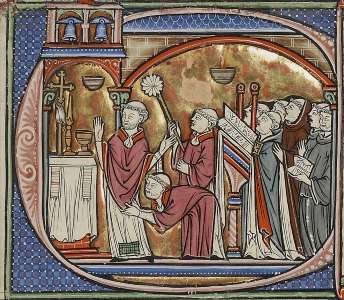 The Eucharist is critical to forgiveness. Jesus fulfilled the Old Testament, and in doing so, He offered a pure sacrifice. Moses used the blood of the sacrifice to unite the people to God, sprinkling the blood on the people and the altar. This was the covenant God established with His people.
The Eucharist is critical to forgiveness. Jesus fulfilled the Old Testament, and in doing so, He offered a pure sacrifice. Moses used the blood of the sacrifice to unite the people to God, sprinkling the blood on the people and the altar. This was the covenant God established with His people.
In the new and everlasting covenant established by Jesus, blood is the sign of the covenant. In this covenant, though, Jesus uses His own blood. He sheds His blood on the cross that is effectively the altar of His sacrifice and sprinkles the blood on us through the Holy Eucharist. We must partake in the Eucharist to enter into this covenant.
The passage goes on to explain that this is a once and for all sacrifice. Jesus’ sacrifice on the cross only happened once. At every Mass, we participate in that sacrifice, but Jesus is not crucified over and over. He died once for us. Despite that, He eternally offers Himself to the Father on our behalf, and He offers His body and blood to us in the Eucharist. This is why we understand that there is only one Mass. Everywhere and at every time, the Mass on earth is a participation in the single Mass that is in heaven.
Hebrews 10:19-22 – The Veil of His flesh
Therefore, brothers, since through the blood of Jesus we have confidence of entrance into the sanctuary by the new and living way he opened for us through the veil, that is, his flesh, and since we have “a great priest over the house of God,” let us approach with a sincere heart and in absolute trust, with our hearts sprinkled clean from an evil conscience and our bodies washed in pure water.
We have a need for both the Eucharist and Baptism. The passage explains that when we enter into heaven (the sanctuary), we will have our consciences and our bodies cleansed. The blood of Christ in the Eucharist cleanses our consciences and gives us the confidence to enter. It is through the flesh of Christ, the Eucharist, that we enter. And it is with the waters of Baptism that our bodies of are washed. Baptism begins our preparation, but it is through the Eucharist that our preparation is completed and we are able to enter heaven.
Images:
Simon Bening (Flemish, about 1483 – 1561), The Mass of Saint Gregory, about 1535 – 1540, Tempera colors, gold paint, and ink on parchment, Leaf: 13.7 x 10 cm (5 3/8 x 3 15/16 in.), The J. Paul Getty Museum, Los Angeles
Unknown, A Priest Celebrating Mass, about 1460, Tempera colors, gold, and ink on parchment, Leaf: 17.1 x 12.1 cm (6 3/4 x 4 3/4 in.), The J. Paul Getty Museum, Los Angeles
Unknown, A Priest Celebrating Mass, Attended by Men and Women, about 1410, Tempera colors, gold leaf, gold paint, and ink on parchment, Leaf: 17.9 x 13.3 cm (7 1/16 x 5 1/4 in.), The J. Paul Getty Museum, Los Angeles
Follower of the Egerton Master (French / Netherlandish active about 1405 – 1420), A Priest Celebrating Mass, about 1410, Tempera colors, gold leaf, gold paint, and ink on parchment, Leaf: 19.1 x 14 cm (7 1/2 x 5 1/2 in.), The J. Paul Getty Museum, Los Angeles
Unknown, Michael Lupi de Çandiu (Spanish, active Pamplona, Spain 1297 – 1305), Initial E: A Priest Celebrating Mass, about 1290 – 1310, Tempera colors, gold leaf, and ink on parchment, Leaf: 36.5 x 24 cm (14 3/8 x 9 7/16 in.), The J. Paul Getty Museum, Los Angeles